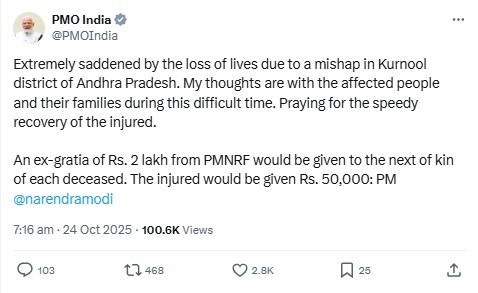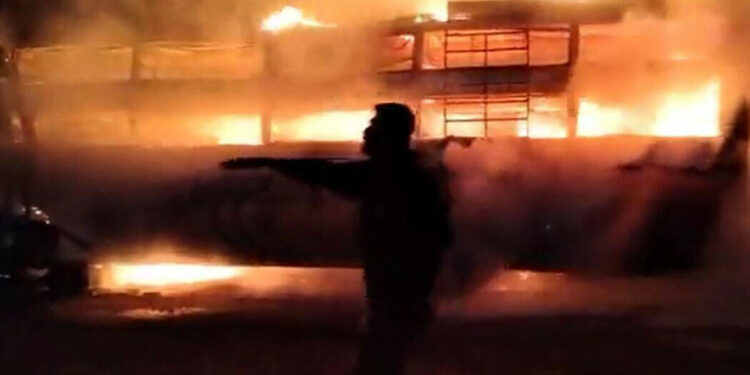
Hyderabad Bengaluru bus fire: A devastating Hyderabad Bengaluru bus fire claimed the lives of at least 12 passengers in the early hours of Friday, after a private Volvo sleeper coach travelling from Hyderabad to Bengaluru burst into flames on NH-44 near Kurnool. The accident occurred around 3:30 am, when most passengers were asleep and had little time to react. According to preliminary reports, the bus collided with a two-wheeler, which became lodged under the vehicle, triggering sparks that quickly spread into a massive fire.
Eyewitnesses reported that the fire engulfed the bus within minutes, leaving the passengers in a state of panic as thick smoke filled the AC coach. Survivors said they could barely see or breathe, and were forced to break windows with their hands and feet to escape. Around 20 people managed to jump out in time, but several others were trapped inside as the flames intensified. Disturbing visuals from the spot showed the vehicle reduced to a charred shell, indicating the sheer heat and speed of the blaze.
Locals and passing truck drivers tried to help, but the flames were too strong to approach. Fire tenders arrived shortly after, but by then, the damage was already irreversible. The Kurnool accident has shaken residents of the region and once again exposed the vulnerabilities of night highway travel.
Leaders React, Probe Launched; Questions Raised Over Highway & Bus Safety
Following the tragedy, a forensic team and local police have begun investigating the NH-44 bus accident to determine the exact cause of the fire. Authorities confirmed that the bus had a valid fitness certificate valid till 2027, but experts say that fitness documents alone cannot guarantee passenger safety unless buses are equipped with proper emergency exits, fire extinguishers, and quick-evacuation mechanisms. The bus driver is reportedly missing and is being traced for questioning.
Several injured passengers are undergoing treatment at nearby hospitals, and police teams are working to identify the deceased, some of whom have been burnt beyond recognition. The Andhra Pradesh Transport Department has announced a detailed safety review of all private long-route buses operating on state and national highways. Road-safety activists say this accident should be a wake-up call for the transport system, stressing that AC sleeper buses often act like “fire chambers” during accidents because smoke accumulates rapidly inside sealed coaches.
The tragedy has triggered nationwide mourning. Prime Minister Narendra Modi expressed deep grief and announced compensation of ₹2 lakh for families of the deceased and ₹50,000 for the injured. President Droupadi Murmu and Chief Minister N. Chandrababu Naidu also offered condolences, assuring all possible support to those affected. Local leaders visiting the scene described it as “one of the most horrifying accidents in recent memory.”

A Grim Reminder of Recent Highway Disasters
The Hyderabad to Bengaluru bus accident comes barely days after a similar bus fire in Rajasthan that killed 20 passengers. With two major fire-related bus tragedies within weeks. A special inquiry committee has been formed to investigate what exactly caused the accident—overspeeding, driver fatigue, poor lighting, vehicle malfunction, or highway design flaws. Experts argue that India’s fast-growing road network still lacks modern safety elements such as crash barriers, smart surveillance, and rapid medical response units. Simultaneously, activists are pointing to the urgent need for stricter rules for night-time bus operations, periodic vehicle fitness checks, and mandatory driver rest cycles.
This tragic event has reignited a critical national question: Are we prioritizing speed and convenience over human lives?
As grieving families wait for answers, the Hyderabad Bengaluru bus fire stands as a heartbreaking reminder of how ordinary journeys can turn into nightmares on India’s highways. The investigation continues, but the call for stronger safety reforms is growing louder, with citizens demanding accountability and long-term change to prevent such tragedies in the future.












